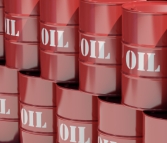OPEC boosts group oil production to highest level since '08 recession
LONDON -- Acting to dampen market nervousness amid Iran supply fears, OPEC on Thursday said it was pumping more oil than the market needs - at levels not seen since summer 2008 - and signaled demand destruction had been halted for now.
The cautious optimism, combined with a production boost sufficient to cover all of Iran's oil exports, is likely to further stabilize oil markets, where volatility has already markedly declined in recent weeks.
In its latest monthly market report, the Organization of Petroleum Exporting Countries said its crude production was 32.42 million bpd in March, up 317,000 bpd from the previous month.
"Higher non-OPEC supply and rising OPEC production has resulted in total supply exceeding market needs in the first quarter of this year," the group said.
 OPEC's production number, based on disclosures by its members, is the highest since the summer 2008, after which time the group embarked on production cuts to revive flagging prices amid a global recession.
OPEC's production number, based on disclosures by its members, is the highest since the summer 2008, after which time the group embarked on production cuts to revive flagging prices amid a global recession.
It has now reversed its production trend as it seeks to dampen prices that are now well above its ideal level of $100/bbl.
After downgrading oil consumption forecasts in recent months, the group also appears to be also more optimistic on the health of crude demand.
It slightly upgraded its global oil demand growth figure for 2012, by 40,000 bpd to around 900,000 bpd. Global oil demand is now estimated at 88.67 million bpd this year.
"Given the stabilization of the US economy and the shutdown of Japanese nuclear power plants, world oil demand growth has - at least for the short-term - stopped its declining trend," OPEC said.
However, the group, whose members produce one in three barrels consumed worldwide, warned against any complacency over the strength of the recovery.
"Overall, the global economic outlook remains fragile, with heightened uncertainties in the euro zone and potential spill-over effects in the emerging markets," it said.
Yet OPEC could now claim it has played its part in helping stabilize oil markets made jittery by Iran supply fears. Earlier this year, prices rocketed to $128/bbl after sanctions started denting oil exports from Iran and it threatened to block the Strait of Hormuz, a key oil shipping route.
But other OPEC members, notably Saudi Arabia, have boosted output by 2.2 million bpd within six months - enough to make up for a total shutdown of Iran's normal oil exports.
The effort has contributed to a buildup of US oil inventories to levels not seen in 21 years and to lower, less volatile oil prices.
Brent - the most widely traded oil contract worldwide - has dropped by $10/bbl to about $118/bbl, while the US's West Texas Intermediate has fallen under $100/bbl. Both contracts have traded in windows of about $2/bbl since mid-April, compared with gyrations of $5/bbl the previous month.
However, the group may face renewed strife if it keeps pumping at current levels. In its report, OPEC said average demand for its crude this year stands at the same level as its agreed ceiling of 30 million bpd. But that's two million bpd less than its current production.
Iran last month accused Saudi Arabia - the group's largest producer by far - of a breach its OPEC commitments, sparking fears of a repeat of a cantankerous meeting last June where both sides clashed over production.
OPEC is next due to debate output June 14 in Vienna.
Disclosures by the group's members also point to sharp discrepancies on production estimates, pegging March output at 1.1 million bpd higher than figures from independent oil consultancies.
Much of the difference stems from numbers supplied by Venezuela and Iran - two members who have long disputed third-party estimates of their production.
For instance, secondary sources peg Iran's April production at its lowest level in 20 years, at 3.2 million bpd, over half a million bpd lower than Iran's official number.
Dow Jones Newswires






Comments